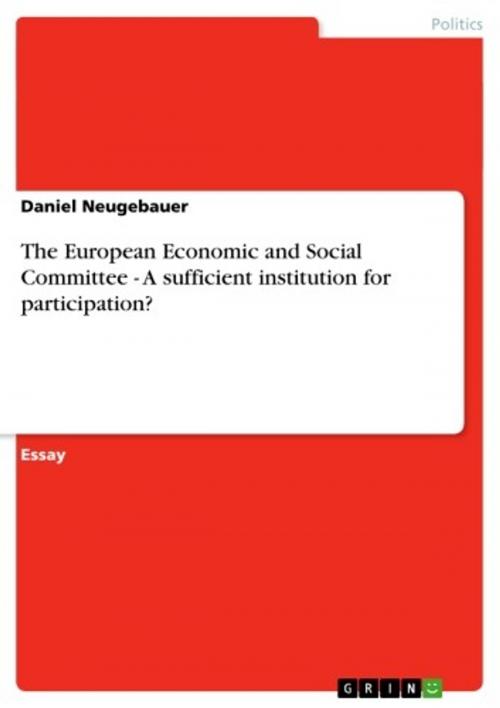The European Economic and Social Committee - A sufficient institution for participation?
A sufficient institution for participation?
Nonfiction, Social & Cultural Studies, Political Science| Author: | Daniel Neugebauer | ISBN: | 9783638627740 |
| Publisher: | GRIN Verlag | Publication: | March 16, 2007 |
| Imprint: | GRIN Verlag | Language: | English |
| Author: | Daniel Neugebauer |
| ISBN: | 9783638627740 |
| Publisher: | GRIN Verlag |
| Publication: | March 16, 2007 |
| Imprint: | GRIN Verlag |
| Language: | English |
Essay from the year 2007 in the subject Politics - International Politics - Topic: European Union, grade: 2,0, University of Twente (Bedrijf Bestuur en Technologie), course: European Institutions, 7 entries in the bibliography, language: English, abstract: Although the European Economic and Social Committee exists since 1957, there is only scarce literature on this institution. While in the 80s and 90s a few articles and books were published, there has been hardly any literature since 2000. This mere fact may already provide an indication of the Committee's role in today's institutional structure of the European Union: Civil society has found other ways of representation. On the one hand, formal ways of participating in the decision making process increased, for instance through the various consultative bodies around the European Commission. On the other hand, informal participation through lobbying has grown and is often regarded as being more profitable and more efficient than the involvement of an assembly with 344 members which has to agree with a majority on its opinions. Not only on this account is the work of the EESC facing critics. Under the heading 'Four good reasons to abolish the Economic and Social Committee', Helle Thorning-Schmidt (2003), member of the European Convention and European Parliament, challenges the Committee's right to exist. Her accusations are profound: Unfocused, too expensive, inefficient and not sufficiently European was the EESC's work. Other authors are not so pessimistic. Vierlich-Jürcke (1998) refers to the Committee's ability to 'democratize' the decision making system in the European Union by fostering the dialogue between government and the public. Smismans (2000) agrees on these positive effects, but is in favour of some changes to the composition of the Committee. He wants to strengthen links between civil society, broaden the deliberative basis and bring more expertise. He states that an increased input-legitimacy contributes to output-legitimacy. On a more abstract basis, the critics are not only about efficiency and legitimacy. The question whether the Committee has (still) a right to exist touches the concept of democracy we want to establish in the European Union. The EU has been a 'participatory democracy' from the beginning, and the Constitution's article 46 again strengthens possibilities to participate.
Essay from the year 2007 in the subject Politics - International Politics - Topic: European Union, grade: 2,0, University of Twente (Bedrijf Bestuur en Technologie), course: European Institutions, 7 entries in the bibliography, language: English, abstract: Although the European Economic and Social Committee exists since 1957, there is only scarce literature on this institution. While in the 80s and 90s a few articles and books were published, there has been hardly any literature since 2000. This mere fact may already provide an indication of the Committee's role in today's institutional structure of the European Union: Civil society has found other ways of representation. On the one hand, formal ways of participating in the decision making process increased, for instance through the various consultative bodies around the European Commission. On the other hand, informal participation through lobbying has grown and is often regarded as being more profitable and more efficient than the involvement of an assembly with 344 members which has to agree with a majority on its opinions. Not only on this account is the work of the EESC facing critics. Under the heading 'Four good reasons to abolish the Economic and Social Committee', Helle Thorning-Schmidt (2003), member of the European Convention and European Parliament, challenges the Committee's right to exist. Her accusations are profound: Unfocused, too expensive, inefficient and not sufficiently European was the EESC's work. Other authors are not so pessimistic. Vierlich-Jürcke (1998) refers to the Committee's ability to 'democratize' the decision making system in the European Union by fostering the dialogue between government and the public. Smismans (2000) agrees on these positive effects, but is in favour of some changes to the composition of the Committee. He wants to strengthen links between civil society, broaden the deliberative basis and bring more expertise. He states that an increased input-legitimacy contributes to output-legitimacy. On a more abstract basis, the critics are not only about efficiency and legitimacy. The question whether the Committee has (still) a right to exist touches the concept of democracy we want to establish in the European Union. The EU has been a 'participatory democracy' from the beginning, and the Constitution's article 46 again strengthens possibilities to participate.















